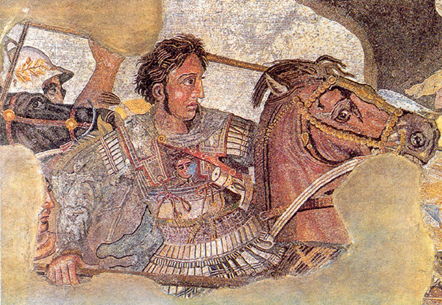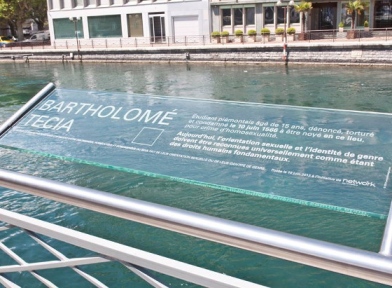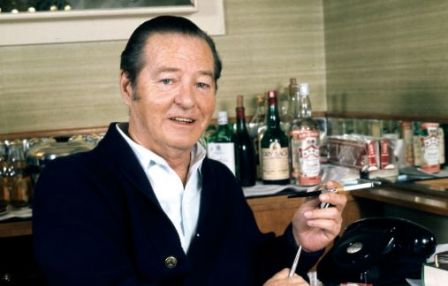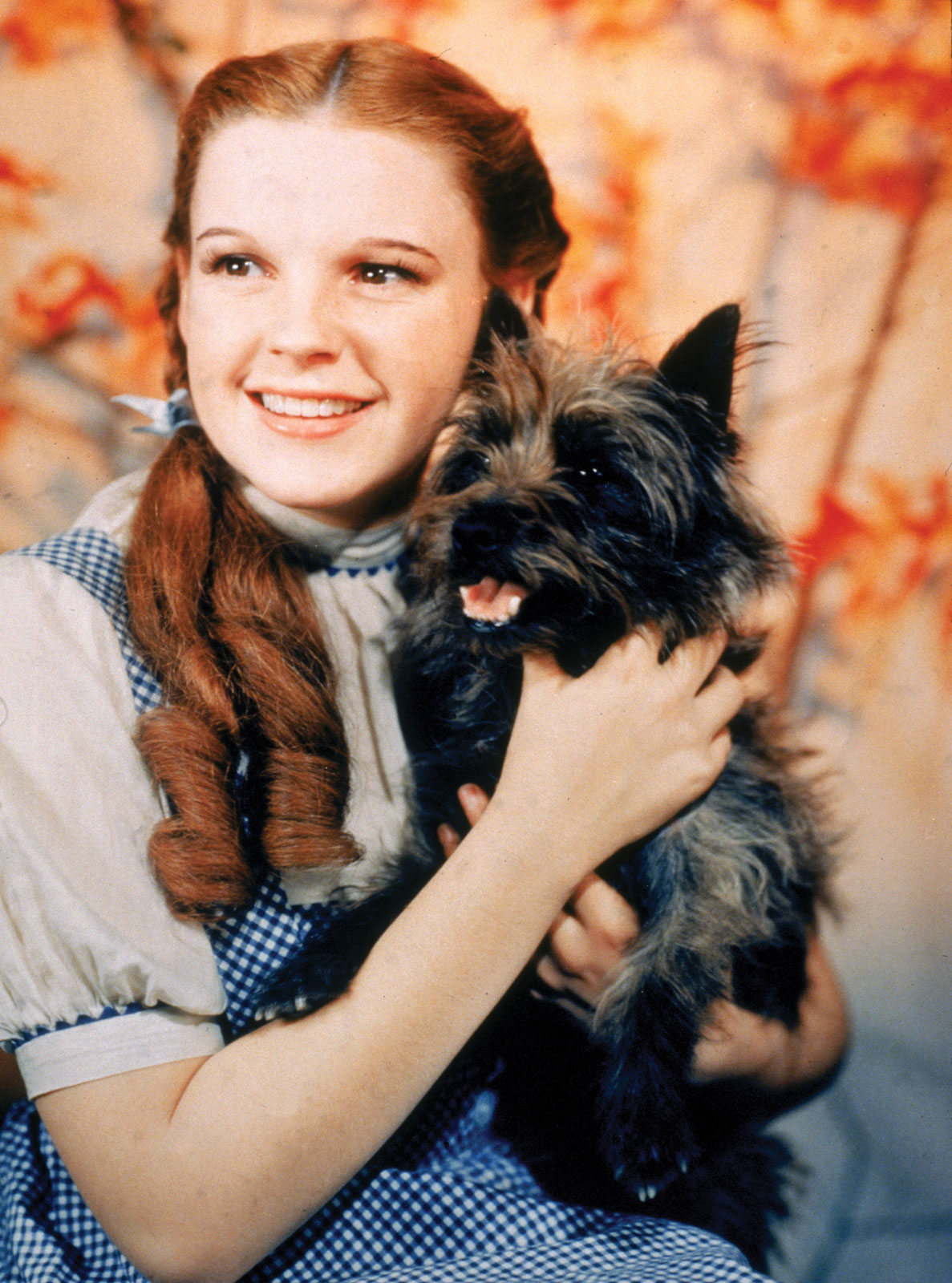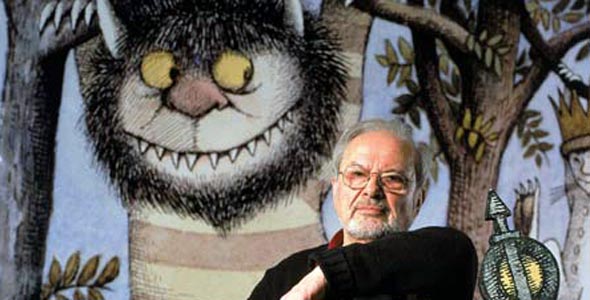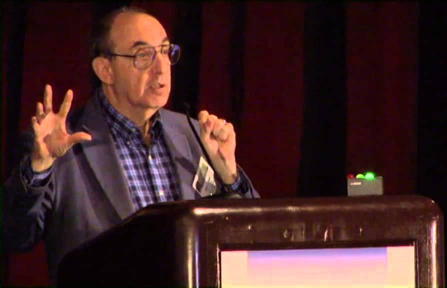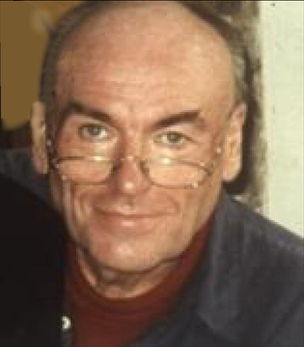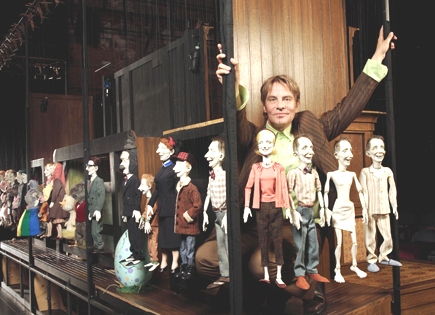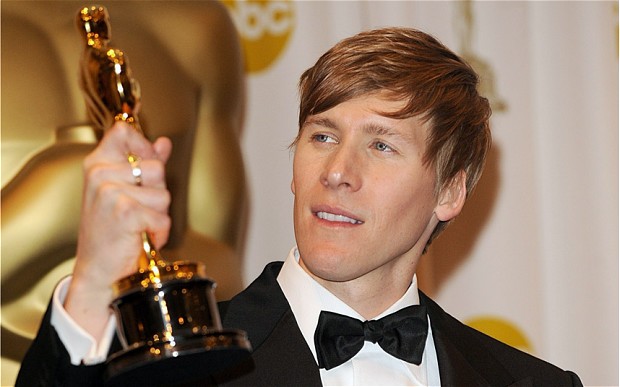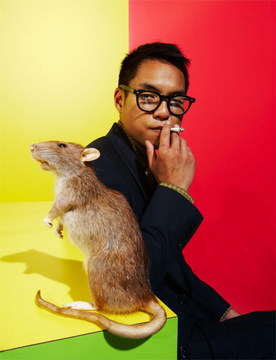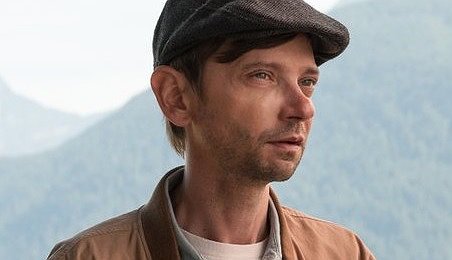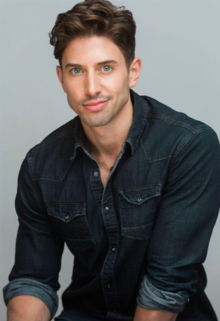|
presents THIS DAY IN GAY HISTORY based on: The White Crane Institute's 'Gay Wisdom', Gay Birthdays, Gay For Today, Famous GLBT, glbt-Gay Encylopedia, Today in Gay History, Wikipedia, and more …
Collected by Ted June 10 [{(o)}]|[{(o)}]|[{(o)}]|[{(o)}]| [{(o)}]|[{(o)}]
323 BC – Alexander The Great died (b.356 BC). Alexander was not only a great soldier, but he was also renowned for his love of his comrade-in-arms Hephaestion. (Click for Larger) Hephaestion was clearly his lover. Alexander, like many ancient Greeks, cultivated an ideal of heroic friendship that did not exclude sexual expression. He carried with him on his conquests a copy of the Iliad, and sought to emulate its heroes. When he first crossed into Asia and reached Troy, he sacrificed on the tomb of Achilles while Hephaestion did the same on that of Patroclus. So close did Alexander feel to Hephaestion that when the captured women of the Persian King's household mistakenly threw themselves at Hephaestion's feet rather than at his own, he found no offense in this and excused them by saying that his friend was another Alexander. Finally, his grief at the death of Hephaestion, one year before his own, was also — in its intensity and public display — to parallel that of the Homeric lovers. Alexander died in the palace of Nebuchadrezzar II of Babylon. He was just one month short of attaining 33 years of age.
"In 1566, as Bartholomé was led to his death, no one stood, as we stand today, to decry the State-sanctioned killing of a child on suspicion of homosexuality," said Marcia V.J. Kran of the UN Human Rights Office. "No one was prepared, as we are today, to challenge homophobic prejudice, to insist on the equal worth and equal rights of every person, irrespective of their sexual orientation and gender identity. It would be beautiful to think that out of this one sad, lonely death in the Rhone, more than four centuries ago, might come some good; that passers-by who see this plaque will pause and reflect on the folly of homophobia; and that we can all draw from Bartholomé's story the strength to continue our modern day struggle to achieve equality for LGBT people everywhere."
1911 – The British playwright Terence Rattigan, was born on this date (d.1977). One of England's most popular 20th century dramatists, he was born in London of Irish extraction, educated at Harrow and Trinity College, Oxford, and his plays are generally situated within an upper middle class background. His plays were more or less pushed off the stage by the works of Osborne, Wesker, Pinter and Arden and were considered passé in the 60s, so he never really received his due as a playwright. Yet, his plays have held up very well, even as the reputations of his once-revolutionary successors have declined a bit. Rattigan's The Browning Version (1948), an effective and masterful study of failure, may be seen as a precursor of Edward Albee's Who's Afraid of Virginia Woolf? The horror of a particular type of marriage, in which the pain inflicted on each partner is ultimately the pleasure of both, is as fully explored in Rattigan's one-act play as it is in Albee's much longer drama. It is not difficult to understand why Rattigan so admired the talents of Joe Orton and was instrumental in helping to get the young writer's early plays produced. A recent review of a New York production of The Browning Version implied, snidely, that a more balanced view of marriage might have come from a heterosexual playwright. Until that review, there were probably no more than three New York theater-goers who ever conceived of Terence Rattigan as anything but straight. Rattigan was homosexual, with a string of lovers but no long-term partners. It has been claimed that his work is essentially autobiographical, containing coded references to his sexuality, which he kept secret from all but his closest friends. There is some truth in this, but it gets distorted; for example, the repeated claim that Rattigan originally wrote The Deep Blue Sea as a play about male lovers, turning into a heterosexual play at the last minute, is unfounded. His female characters are written as females and are in no sense 'men in drag'. Fifteen years after his death, largely through a revival of The Deep Blue Sea, at the Almeida Theatre, London, directed by Karel Reisz, Rattigan has increasingly been seen as one of the century's finest playwrights, an expert choreographer of emotion, and an anatomist of human emotional pain. A string of successful revivals followed, including Man and Boy at the Duchess Theatre, London, in 2005: In Praise of Love at the Chichester Festival Theatre; and Separate Tables at the Royal Exchange, Manchester, in 2006.
The tragic aspects of gay identification with Garland were being discussed in the mainstream as early as 1967. Time magazine, in reviewing Garland's 1967 Palace Theatre engagement, disparagingly noted that a "disproportionate part of her nightly claque seems to be homosexual." It goes on to say that "[t]he boys in the tight trousers" (a phrase Time repeatedly used to describe gay men, as when it described "ecstatic young men in tight trousers pranc[ing] down the aisles to toss bouquets of roses" to another gay icon, Marlene Dietrich)would "roll their eyes, tear at their hair and practically levitate from their seats" during Garland's performances. Time then attempted to explain Garland's appeal to the homosexual, consulting psychiatrists who opined that "the attraction [to Garland] might be made considerably stronger by the fact that she has survived so many problems; homosexuals identify with that kind of hysteria" and that "Judy was beaten up by life, embattled, and ultimately had to become more masculine. She has the power that homosexuals would like to have, and they attempt to attain it by idolizing her." In discussing Judy Garland's camp appeal, gay film scholar Richard Dyer asserts Garland is camp because she is "imitable, her appearance and gestures copiable in drag acts". He calls her "ordinariness" in her early MGM films camp in their "failed seriousness" and her later style "wonderfully over-the-top." Garland herself acknowledged her camp appeal during her lifetime, saying "When I die I have visions of fags singing 'Over the Rainbow' and the flag at Fire Island being flown at half mast." Other connections between Garland and LGBT people include the slang term "Friend of Dorothy", which likely derives from Garland's portrayal of Dorothy Gale in The Wizard of Oz and became a code phrase gay people used to identify each other. Dorothy's journey from Kansas to Oz "mirrored many gay men’s desires to escape the black-and-white limitations of small town life...for big, colorful cities filled with quirky, gender-bending characters who would welcome them." Another connection is the rainbow flag, symbol of the LGBT communities which may have been inspired, in part, by Garland's song "Over the Rainbow." Garland's performance of this song has been described as "the sound of the closet," speaking to gay men whose image "they presented in their own public lives was often at odds with a truer sense of self that mainstream society would not condone." Judy Garland's father and other significant people in her life were also gay. Frank Gumm would apparently seduce or at least keep company with very young men or older teens, then move on when told to leave or before his activities could be discovered. Garland's husband Vincente Minnelli was rumored to be a closeted bisexual. From the beginning of her Hollywood career, Garland liked to visit gay bars with openly gay friends Roger Edens and George Cukor, to the chagrin of her handlers at MGM. While Garland did not specifically attempt to connect with gay audiences, she was known to accept and respect gay people, giving them a visibility they did not often enjoy.
1928 – Born: American writer and illustrator Maurice Sendak (d.2012). Best known for his book Where the Wild Things Are, published in 1963, Sendak was born in Brooklyn. Where the Wild Things Are won the 1964 Caldecott Medal. In 1970 he won the Hans Christian Andersen Award for children's book illustration, and in 2003 he shared the Astrid Lindgren Memorial Award with Christine Nöstlinger, the first time it was awarded. He was awarded a National Medal of Arts in 1996. Sendak hates anything to do with God or religion, and Judaism in particular ("We were the `chosen people,' chosen to be killed?") He's also fonder of dogs then people. ("I hate people," he told one interviewer, extolling the superior company of dogs, like his sweet-tempered German shepherd, Herman, named after Melville). Sendak is, at heart, a curmudgeon, but a delightful one, with a vast range of knowledge, a wicked sense of humor and a talent for storytelling and mimicry. His fascination with the Linberg kidnapping, like many of the other details of his life, has been repeated endlessly over the years in the hundreds of interviews he has given. Was there anything he had never been asked? He paused for a few moments and answered, "Well, that I'm Gay." Sendak lived with Eugene Glynn, a psychoanalyst, for 50 years (Glynn died in 2007). A Gay artist in New York is not exactly uncommon, but Mr. Sendak said that the idea of a Gay man writing children books would have hurt his career when he was in his 20s and 30s. He spends his days pondering his heroes: Mozart, Keats, Blake, Melville and Dickinson. He admires and yearns for their "ability to be private, the ability to be alone, the ability to follow some spiritual course not written down by anybody."
1938 – Daryl J. Bem is a social psychologist and professor emeritus at Cornell University. He is the originator of the self-perception theory of attitude formation and change. He has also researched psi phenomena, group decision making, handwriting analysis, sexual orientation, and personality theory and assessment. Bem received a BA in physics from Reed College in Portland, Oregon, in 1960 and began graduate work in physics at the Massachusetts Institute of Technology. The civil rights movement had just begun, and he became so intrigued with the changing attitudes toward desegregation in the American South that he decided to switch fields and pursue a career as a social psychologist specializing in attitudes and public opinion. He obtained his PhD in social psychology from the University of Michigan in 1964. Bem's Exotic Becomes Erotic theory (EBE) presents one possible explanation as to what differentiates homosexuality from heterosexuality. Bem theorized that the influence of biological factors on sexual orientation may be mediated by experiences in childhood, that the child's temperament predisposes the child to prefer certain activities over others. Bem noted that because of their temperament, which is influenced by biological variables such as genetic factors, some children will be attracted to activities that are commonly enjoyed by other children of the same gender, while others will prefer activities that are typical of the other gender. Bem theorized that this makes a gender-conforming child feel different from opposite-gender children, while gender-nonconforming children will feel different from children of their own gender. He believes that this feeling of difference evokes physiological arousal when the child is near members of the gender which the child considers as being "different". Bem theorizes that this physiological arousal is later transformed into sexual arousal: that is, as adults, people become sexually attracted to the gender which they came to see as different, or "exotic", while they were children. Bem based this theory in part on the finding that a majority of gay men and lesbians report being gender-nonconforming during their childhood years. A meta-analysis of 48 studies showed childhood gender nonconformity to be the strongest predictor of a homosexual orientation for both men and women. Bem also noted that in a study by the Kinsey Institute of approximately 1000 gay men and lesbians (and a control group of 500 heterosexual men and women), 63% of both gay men and lesbians reported that they did not like activities typical of their sex in childhood, compared with only 10–15% of heterosexual men and women. Bem also drew from six prospective studies, longitudinal studies that began with gender-nonconforming boys around age 7 and followed them into adolescence and adulthood; a majority (63%) of the gender nonconforming boys become gay or bisexual as adults. Bem married Sandra Bem (née Lipsitz), also a psychology professor, in 1965. Though still legally married, they were "amicably separated" from 1994 until her death in 2014. In 2015, he married his partner of twenty years, Ithaca College professor of communication studies, performance studies, and queer studies Bruce Henderson. They live in Ithaca, NY.
1942 – Hans Eppendorfer, born in Lütjenburg as Hans-Peter Reichelt was a German writer (d.1999). In wartime and postwar Germany, Hans grew up as an illegitimate child of a hairdresser with his grandmother and aunt, first in Lower Silesia , and later with his aunt in Göppingen , Baden-Wuerttemberg , until he was sentenced to ten years youth imprisonment at the age of seventeen years for robbery and murder of an elderly lady he had befriended. To make matters worse were his previous thefts and the failed attempts of his probation officers to place him in a boarding school and to have him educated. He began writing poetry and short stories while in prison. After his release, he worked as a warehouse worker in a publishing house, later as an editorial assistant.He sought out the Hamburg writer and ethnographer Hubert Fichte, who he had already contacted in prison, in the homosexual scene in Hamburg. He conducted a series of interviews entitled The leather man speaks with Hubert Fichte. Although the series attracted a great deal of attention because of its sex, violence and descriptions of the committed murder, we now know that large parts of the interviews are fictional in nature, often developed by Hans himself, who wanted to create a new identity as a writer. The interviews were published in book form and as a stage adaptation and have been translated into six languages. The disputes over the rights to the text led to a rift between Hans and Fichte that could not longer be repaired until Fichte's death. On March 26, 1971, the homosexual Hans married the then well-known and 25 years older fabric designer Margret Hildebrand, whom one of her students had introduced to him at a party. He moved to live with her in the Hamburg district of Eppendorf, which led to his pseudonym. This gave him economic security. This was followed by numerous trips to the Middle East, the USA, southern Europe and Asia. These trips today would likely be called sex tourism, but which he glorified as educational trips. For several years he worked as a freelancer for the St. Pauli Nachrichten and the gay magazine him applaus, which appeared every eight weeks and which he headed as editor-in-chief from April 1976 until in April 1981. St. Pauli, where Eppendorfer was the official Hamburg district writer in 1981/1982, and the experiences in the local neighborhood , were also reflected in his novel Scenes from St. Pauli and the screenplay for Walter Bockmayer's Kiez - Rise and Fall of a Luden (1983). Because of the unsanctioned publication of the first-mentioned book and the failure to name the Hamburg cultural authority, which supported Eppendorfer financially, there was a falling out between him and the authority. Together with Dieter Wedel and Alexander Schuller, he wrote the screenplay for the multi-part television series König von St. Pauli with Oliver Hasenfratz and Julia Stemberger; a book version of it was also published. In 1998, shortly before his death, the director Peter Kern, who was a friend of Eppendorfer, dedicated the film portrait Hans Eppendorfer - Search for his Life, which premiered during the Hamburg Film Festival on September 25, 1998. According to Presley, it was "probably intended as a kind of legacy and consolidation of his view of his life and understood by him as well as by the director ...". The news magazine Der Spiegel commented on the work: "A bundle of document and drama, partly serious, partly grotesque and occasionally uncomfortably silly."Shortly after the production was completed, Hans Eppendorfer died in Hamburg at the age of 56 on January 23, 1999 of a brain tumor.
Burkett was born and raised in Lethbridge, Alberta, a town of 25,000 where people who were different paid a price. "I was told I was a fag before I even knew what that was about," says Burkett. "It started early. It was a dirty thing people were hostile about. Then you figure out what it is and that you actually are that, and it just becomes harder. [But] puppetry really helped me because I knew I was getting out." Ronnie Burkett has been captivated by puppetry since the age of seven, when he opened the World Book Encyclopedia to "puppets". He spent most of his youth in Medicine Hat. He attended Vincent Massey, Medicine Hat High School and Medicine Hat College. He spent many an hour pouring over puppet books in the library, performing in local plays and musicals, even earning money by taking his own puppet show on the road as a young teen. After winning a regional Emmy Award in 1979 for the puppets in "Cinderrabbit" on PBS in the US, Burkett formed his own theatre company Ronnie Burkett Theatre of Marionettes in Alberta in 1986 and began touring with the brilliant one-man marionette show for which he has become known. While he collaborates with other theatre artists and uses a full stage crew, Ronnie himself is the only performer. He operates two to four marionettes at a time. He uses as may as 40 puppets to create ten or more characters per show, and frequently calls on his remarkable improvisational skills. Ronnie builds marionettes for his own productions as well as for television. One of his best-known productions is Tinka's New Dress. Based on the illegal "Daisy" plays of Nazi-occupied Czechoslovakia, this political satire premiered in Winnipeg in 1994. It received rave reviews in the Toronto and Ottawa the following year, and was featured at Germany's Meiningen Theatre Week in 1996. Tinka's New Dress received six Dora Mayor Moore Award nominations from the Toronto Theatre Alliance, winning for Best Set Design and Best Costume Design and marking the first time a puppeteer has been nominated for the Best Actor Award. Tinka's New Dress was the first part of a trilogy which continued with Street of Blood in 1999 and Happy in 2000. Ronnie pours his spirit into his art. This gay master puppeteer is no shrinking violet. Ronnie has been called the "bad boy" of the puppet world. His characters know how to camp with the best drag queen on Church Street. Ronnie has succeeded by daring to be different. In his career as a theatre artist, he has achieved renown for his one-man marionette productions and has almost single-handedly reinstated the puppet as a legitimate form of theatre for adults. All his shows have gay characters in common, something Burkett thinks was new when he first introduced some in 1986, the year he founded his own company. "To be honest with you, I'd never seen anyone put a character who was gay in a text-based puppet show," says Burkett. "I'm not saying it hasn't been done, but I never saw it. Chances are, it wasn't done." He pauses, thinking. "It just seemed natural. They don't always have to be happy characters or successful characters because I do know that there's a pretty emotionally stable big homo [pulling the strings] right above them." Openly gay, Burkett lives in Toronto with his partner, jazz singer John Alcorn.
1964 – Born: Ben Daniels, an English actor who has won a Laurence Olivier Theatre Award. Born in Nuneaton, Warwickshire, England, the six-feet tall, blonde-haired and blue-eyed Daniels trained at the London Academy of Music and Dramatic Art for three years. Since then, has appeared in many UK television shows and dramas, such as The Lost Language of Cranes (1991), Soldier Soldier (1991-1997), A Touch of Frost (1992-present), Outside Edge (1994), Cutting It (2002-2005) (as the philanderer Finn Bevan), and The Virgin Queen (2005). He played the role of Mercutio in the 1994 TV production of Shakespeare's Romeo and Juliet, and the part of Jonathan in the 1997 Emmy-nominated TV film, David. In Ian Fleming: Bondmaker (2005), Daniel performed as the famous English author and journalist Ian Fleming. He appeared in the BBC television mini-series The State Within (2006). Daniels may be best known to American audiences for his portrayal of Tony in the 1996 gay film Beautiful Thing, written by Jonathan Harvey and based on his play of the same name. Daniels is openly gay and lives in south London. He remarked: "Out? I've never been in." He lives with actor Ian Gelder. They began seeing each other during a 1993 production of Joe Orton's Entertaining Mr Sloane. Daniels was already sure of his sexuality in his teens, although he did not discuss the matter with his parents because they did not have a very close emotional relationship. He was "cautious about mentioning it when I left drama school, because AIDS was terrifying everyone and there was a huge homophobic backlash". He decided to come out at the age of 24, while appearing in an all-star benefit performance of Martin Sherman's Bent. Daniels said in an interview: "Homophobia is still shockingly prevalent in film and TV. I know I've lost work because of being gay, and it is always an issue. Even on a serious BBC Two drama, there will be some suit in some office going, "Hmmm, isn't he a poof?" I don't consider myself politically gay, but whenever I catch a whiff of that now, I'm on it like a ton of bricks."
1974 – Dustin Lance Black is an American screenwriter, director, film and television producer, and LGBT rights activist. He has won two Writers Guild of America Awards for his work on the television series Big Love and an Academy Award for the 2008 film Milk. Black was born in Sacramento, California and grew up in a Mormon household, in San Antonio, Texas and later moved to Salinas, California when his mother remarried. His father had been the Mormon missionary who had baptized Black's mother earlier. Growing up surrounded by Mormon culture and military bases, Black worried about his sexuality. He told himself, "I'm going to hell. And if I ever admit it, I'll be hurt, and I'll be brought down" when he found himself attracted to a boy in his neighborhood at the age of six or seven. He says that his "acute awareness" of his sexuality made him dark, shy and at times suicidal, but he came out in his senior year of college. Black attended the University of California, Los Angeles, School of Theater, Film, and Television (UCLA) while apprenticing with stage directors, taking acting jobs and working on theater lighting crews. In 2000, he wrote and directed The Journey of Jared Price, a gay romance film, and Something Close to Heaven, a gay coming-of-age short film. In 2001, he directed and was a subject in the documentary On the Bus about a Nevada road trip and adventure at Burning Man taken by six gay men. Raised as Mormon, he was hired as the only such writer on the HBO drama series Big Love about a polygamistic family. Black had first visited San Francisco in the early 1990s, while AIDS was devastating the city's gay community. Black said that, "Hearing about Harvey was about the only hopeful story there was at the time." He had first viewed Rob Epstein's documentary The Times of Harvey Milk when he was in college, and thought, "I just want to do something with this, why hasn't someone done something with this?" Researching Milk's life for three years, Black met with Milk's former aides Cleve Jones and Anne Kronenberg, as well as former San Francisco Mayor Art Agnos, and began to write a feature film screenplay encompassing the events of Milk's life. The screenplay was written on spec, butGus Van Sant signed on to direct the feature. which eventually won an Academy Award for Black. Black has been in a relationship with British Olympic diver Tom Daley since 2013. They live together in London. In October 2015, it was announced that Black and Daley had become engaged. Daley and Black married at Bovey Castle in Devon on 6 May 2017. In 2014, Black was one of eight potential commencement speakers invited by Pasadena City College, and he accepted. After school officials learned of nude pictures of Black having unprotected gay sex were leaked online, the college announced that Black had not been officially invited and that the unofficial invitation was "an honest error". Following talks between Black's and PCC's attorneys, the college board of trustees apologized and formally invited him.
Wong was born in Vancouver, British Columbia, Canada on June 10, 1974. He attended the University of Toronto for two years, subsequently moving to New York City in 1997 to continue his education at the Cooper Union School of Art, where he studied art and architecture, eventually concentrating on sculpture. He met his American-born partner of 5 years Timothy Edward "Tim" Dubitsky, an artist and designer, in New York City in 2004. A provocateur, Wong operated on the fringes of the traditional design world, creating objects like a stack of 100 $1 bills, bound in peelable glue like a notepad; a gold-plated McDonald's coffee stirrer, a riff on the plastic version that was popular among drug users before being withdrawn; and a diamond mounted up-side down, so that the wearer could use it to scratch graffiti. Wong committed suicide on May 30, 2010 at his East Village apartment in New York City, New York at the age of 35. A New York Times report after Wong's death investigated his long history of parasomnia or sleep disorders, his ability to perform "elaborate tasks that require(d) agency and concentration" during sleep, and his partner's conviction that Wong hanged himself while sleep walking.
1976 – On this date West Virginia became the 16th state to repeal its sodomy laws,unlike many states where it took the Supreme Court ruling in Lawrence v. Texas to rule sodomy laws unconstitutional.
1979 – (Donald Joseph) DJ Qualls is an American actor, producer, and model. He is best known for his work in films including Road Trip (2000), The New Guy (2002), Hustle & Flow (2005), and The Core (2003), and for several appearances on television series such as Breaking Bad, Supernatural, Scrubs, Lost, CSI: Crime Scene Investigation, and The Big Bang Theory. He co-starred in the FX comedy series Legit, the Syfy horror series Z Nation, the Amazon Studios show The Man in the High Castle and CW’s Supernatural, where he plays fan-favorite recurring character Garth Fitzgerald IV. Qualls was born in Nashville, Tennessee, one of five children. He was raised in Manchester, Tennessee, and attended school nearby. He was diagnosed with Hodgkin's lymphoma at age fourteen; after two years of treatment, his cancer was said to be in remission. According to Qualls, the chemotherapy at an early age sped up his metabolism and impacted his growth, "It stopped my development," which explains his slender frame. After graduating from Coffee County Central High School, where he was an active member in the Red Raider Band, Qualls attended King's College, London, where he studied English language and English literature. He returned to Tennessee enrolling at Belmont University in Nashville, where he also began acting in a local theater company. In January 2020, Qualls came out as gay on his Twitter account, stating: Yep, I’m gay. Been gay this whole time. Tired of worrying about what it would do to my career," after announcing it at a Jim Jefferies show in San Diego. Qualls has been friends with Jeffries for several years. He has appeared on Jeffries’ comedy show before, in 2018, and worked with the Australian-born comedian’s series “Legit” in 2013. Qualls revealed in May 2024 that he is currently in a relationship with fellow Supernatural actor Ty Olsson, and that the two have plans to get married.
1981 – Jonathan Bennett is an American actor and model. He is known for his roles as Aaron Samuels in the 2004 comedy film Mean Girls, Bud McNulty in 2005’s Cheaper by the Dozen 2 and the title character in the 2009 direct-to-DVD comedy Van Wilder: Freshman Year and his recurring roles as Casey Gant in the UPN mystery drama Veronica Mars and J. R. Chandler in the ABC soap opera All My Children. He is also the host of Food Network’s show Cake Wars. In 2016, Bennett, who is gay himself, played gay sports agent Lucas in two episodes of Hit the Floor. On September 4, 2014, Bennett was announced as one of the celebrities competing on the 19th season of Dancing with the Stars. He was paired with professional dancer Allison Holker. Bennett’s personal motivation for joining the DWTS cast was in memoriam of his parents; his father who had recently died from brain cancer, and his mother died the year prior, and they were both fans of the show. Bennett and Holker were eliminated on Week 6 of competition and finished in 9th place. Bennett is gay and in a relationship with former Amazing Race contestant and current Celebrity Page host Jaymes Vaughan. On November 30th, 2020 Bennett confirmed he was engaged to Vaughan, who proposed on the set for The Christmas House with an original song. 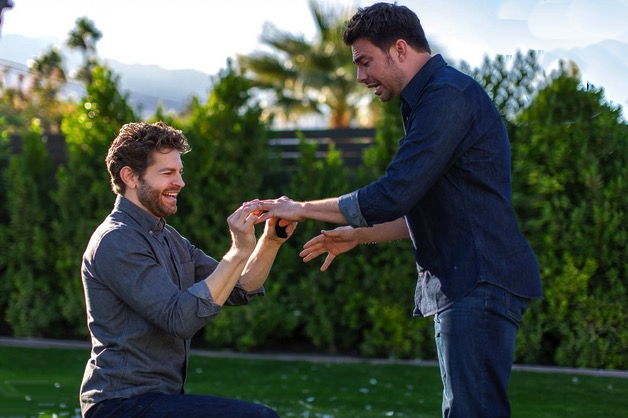 The Proposal
1983 – Nick Adams is an American musical theater actor, singer, and dancer. In 2006 Adams earned a BFA in musical theatre with a minor in dance from the Boston Conservatory of Music. In New York, he joined the international tour of the musical Chicago, later joining the Broadway cast. He was also in the original Broadway cast of The Pirate Queen. In 2007 he co-starred with Mario Lopez as Larry in the Broadway revival of A Chorus Line. In June 2009 he was in the original cast of the Broadway revival of Guys and Dolls. In 2010, Adams played "Angelique" in the original Tony winning revival cast of La Cage Aux Folles on Broadway at the Longacre Theatre, starring Kelsey Grammer.Adams originated and starred in Priscilla, Queen of the Desert, which opened at the Palace Theater on March 20, 2011 after a short run in Toronto at the Princess of Wales Theatre. In 2010, Adams, who is gay, was a part of a PSA for the It Gets Better campaign with cast members from Priscilla Queen of the Desert. In 2016, Adams appeared in season 2 of the sketch LGBT-themed comedy web series Go-Go Boy Interrupted. In July 2009, Adams and his boyfriend went to the Turtle Bay nightclub in Manhattan, where they were denied entry. The bouncer said that the white t-shirt that Adams was wearing did not meet the dress code. Adams reported that he and his boyfriend were holding hands, and the bouncer smirked at them when he refused them entry. Adams claims he then saw a group of men that he described as straight, some wearing white t-shirts, allowed into the bar. Adams posted the story to his blog, and Twitter, where his fans "went crazy". Eventually the manager of the bar posted an apology, and claimed it was a misunderstanding. Adams responded, "I was discriminated against. I will not give my business to Turtle Bay and I urge you to do the same. This womans [sic] attempt to brush this aside as a misunderstanding is disingenuous at best if not hurtful and offensive to myself and the gay community of New York City".
2008 – On this date three islanders from the isle of Lesbos told a Greek court that Gay women insult their home's identity by calling themselves Lesbians. The plaintiffs - two women and a man - were seeking to ban a Greek Gay rights group from using the word "Lesbian" in its name. The Lesbians didn't win their suit. I mean the Lesbians-from-Lesbos Lesbians.
2013 – The Cherry Grove Community House and Theatre, on Fire Island, opened in 1948, was added to the National Register of Historic Places. The theater was cited for being the oldest continuously operating gay and lesbian theater in the United States. Lesbians and gay men were living freely and openly in a place called Cherry Grove, decades before the 1969 Stonewall riots in New York City helped launch the gay rights movement. The seaside resort on Fire Island, about 60 miles east of Manhattan, was known as far back as the late 1940s as a sanctuary where gay writers, actors and businesspeople from the city and beyond escaped to relax, hold hands and show affection in public. Cherry Grove and the nearby Pines neighborhood are the predominantly gay communities on Fire Island, although the Pines developed its reputation as a haven decades after Cherry Grove. It is only the third gay-rights landmark to get the federal designation, joining the Stonewall, where gays clashed with the New York Police Department for three days in 1969 over harassment, leading to the modern gay rights movement, and the Washington, D.C., home of Dr. Franklin E. Kameny, who became a gay rights activist after he was fired from his job with the Army Map Service in 1957 for refusing to answer questions about his sexual orientation. "By the nature of its isolation and beauty, it became a safe haven for gay people, where they could not be afraid of repercussions from work, or anger from their families about being gay," said Thom "Panzi" Hansen, president of the Cherry Grove Arts Project. He and others noted there were occasional raids in which police would enforce laws prohibiting same-sex dancing or ticket people for lewd behavior, but largely because the island was so isolated from the mainland, they were generally left alone. Landlords and businesses desperate for cash after the Depression, the 1938 hurricane and World War II generally overlooked their tenants' sexual orientation in order to fill what were then largely rental properties, locals said. Every July Fourth, a ferry filled with men in drag travels from Cherry Grove to the Pines in a fun-loving commemoration of a man in drag being refused service at a bar in the Pines in 1976. The event commemorates the advances of gays, lesbians and transgender people in the ensuing decades.
[{(o)}]|[{(o)}]|[{(o)}]|[{(o)}]| [{(o)}]|[{(o)}] Today's Gay Wisdom: Dustin Lance Black: On February 22, 2009, Black won the Oscar for Best Original Screenplay for Milk at the 81st Academy Awards. He wore a White Knot to the ceremony as a symbol of solidarity with the marriage equality movement. In his acceptance speech at the Oscar ceremony, he said: "... When I was thirteen years old my beautiful mother and my father moved me from a conservative Mormon home in San Antonio, Texas to California and I heard the story of Harvey Milk and it gave me hope. It gave me the hope to live my life, it gave me the hope to one day I could live my life openly as who I am, and that maybe even I could fall in love and one day get married...' "I want to thank my mom, who has always loved me for who I am even when there was pressure not to...' "But most of all, if Harvey had not been taken from us 30 years ago, I think he would want me to say to all of the gay and lesbian kids out there tonight who have been told that they are less than by their churches, or by the government, or by their families, that you are beautiful, wonderful creatures of value, and that no matter what anyone tells you, God does love you and that very soon I promise you, you will have equal rights federally across this great nation of ours." "Thank you, and thank you God for giving us Harvey Milk."
[{(o)}]|[{(o)}]|[{(o)}]|[{(o)}]| [{(o)}]|[{(o)}] |
